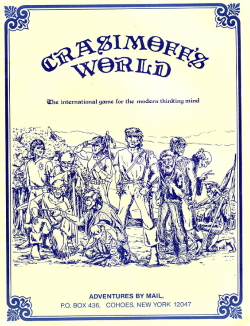Related Research Articles

A play-by-mail game is a game played through postal mail, email, or other digital media. Correspondence chess and Go were among the first PBM games. Diplomacy has been played by mail since 1963, introducing a multi-player aspect to PBM games. Flying Buffalo Inc. pioneered the first commercially available PBM game in 1970. A small number of PBM companies followed in the 1970s, with an explosion of hundreds of startup PBM companies in the 1980s at the peak of PBM gaming popularity, many of them small hobby companies—more than 90 percent of which eventually folded. A number of independent PBM magazines also started in the 1980s, including The Nuts & Bolts of PBM, Gaming Universal, Paper Mayhem and Flagship. These magazines eventually went out of print, replaced in the 21st century by the online PBM journal Suspense and Decision.
Starweb is a closed-end, space-based, play-by-mail (PBM) game. First published by Flying Buffalo Inc. in 1975, it was the company's second PBM game after Nuclear Destruction, the game that started the PBM industry in 1970. Players today can choose a postal mail or email format. Fifteen players per game assume one of six available roles and explore and conquer planets within a universe comprising 225 worlds. The object of the game is to attain a predetermined number of points which are generated by various actions during gameplay. Multiple game variants are available. Starweb is still available for play as of 2021 through the company Rick Loomis PBM Games.
Adventurers Guild was a closed-end, computer-moderated, role-playing play-by-mail (PBM) game. It was available as early as mid-1990 by the publisher, Entertainment Plus More, Inc. Multiple reviewers thought it similar to the PBM game Duelmasters, while reviewer Gordon Blair thought it better than similar games. The game received various reviews in gaming magazines in the 1990s, ranging from poor to positive.

Legends is a turn-based, role-playing game with a medieval setting. It is currently published in English by Harlequin Games. Jim Landes—owner of Midnight Games, the game's first publisher—began developing the game in 1984, eventually publishing it in December 1989 as a play-by-mail (PBM) game after over a year of playtesting. The initial game comprised a module and game system built on the publisher's existing game, Epic, and was run briefly as Swords of Pelarn before publication as Legends. The first of multiple game modules was Crown of Avalon, which allowed up to 200 players per game. Demand by 1991 was "incredible" according to Bruce R. Daniel in White Wolf. Games could be lengthy, initially between three and ten years of play, settling into an average of three years by 2002.
The Tribes of Crane is a play-by-mail game that was published by Schubel & Son. The game was launched in 1978.

Heroic Fantasy is a computer-moderated, dungeon crawl play-by-mail game. It has been active since 1982 when it was published by Flying Buffalo. The initial edition involved nine dungeon levels. Flying Buffalo published subsequent editions due to challenging gameplay initially, eventually limiting the game to four dungeon levels with a fifth outdoors level where players can assemble an army and capture one or more castles. The game is open-ended; gameplay continues until players decide to stop.
Catacombs of Chaos is a play-by-mail game that was published by Schubel & Son.
Star Trek: The Correspondence Game is a play-by-mail game that was published by Entertainment Concepts, Inc.
Realms of Sword and Thunder is a play-by-mail game that was published by Empire Games, Inc.

Hyborian War is a play-by-mail game published by Reality Simulations, Inc. It takes place during the Hyborian Age in the world of Conan the Barbarian created by Robert E. Howard. The game has been continuously available for worldwide play since its inception in 1985 and has changed little in its overall format. It uses a computer program to adjudicate player orders. Although it relies on postal mail or email and has turnaround times which are relatively long for the digital age of video games, Hyborian War has remained active into the 21st century.
Midgard is an open-end, medieval fantasy play-by-mail game. It was published in 1984 by Time Space Simulations. Through 1996, the game passed through more than four different publishers, including Midgard USA. As of 2022, Talisman Games is the publisher. At initial publication, Midgard was computer moderated with partial human moderation.

Crasimoff's World is a play-by-mail (PBM) game that was first developed by Kevin Cropper in 1980. It is regarded as the first fantasy role-playing PBM game.
Lords of the Earth (LOTE) is a play-by-email game, first published by Thomas Harlan in 1983 during a growing era of PBM games. Initially played by postal mail, the game featured mixed moderation—computer moderated with some human assistance. By 2002, the publisher processed turns by email (PBeM). Lords of the Earth comprises multiple campaigns, each one a separate game. Campaign 1 is the oldest, set in the mid-1800s in the "Age of Air and Steam". Other campaigns begin from 2000 BCE to 1400 CE. Settings were global in scale, with one campaign featuring an outer space setting.
Schubel & Son was a hobby and gaming company that published play-by-mail (PBM) games. The company began in 1974 and expanded to large-scale PBM games in August 1978. It also published the game The Tribes of Crane in 1978, followed by StarMaster in 1980 and Global Supremacy in 1982.
Adventures by Mail is a company that published play-by-mail (PBM) games. The company was founded in 1981. It published various PBM games including Beyond the Stellar Empire, It's a Crime, and Monster Island.

Victory! The Battle for Europe is a closed-end, military strategy, play-by-mail (PBM) wargame. The game was first published by Rolling Thunder Games, Inc. in 1991 after a period of initial growth in the PBM industry. The game centers on Europe while including parts of North Africa, the Middle East, the United States, and Canada. Forty players start each game with equal resources among countries, although geography causes differences between starting positions. Games last for about three years each. The game received positive reviews and rankings in the PBM magazine Paper Mayhem in the 1990s, including tying for second place in its Best PBM Game of 1995 list.

Quest is an open-end, fantasy, play-by-mail (PBM) role-playing game. Initially released in the United Kingdom in 1991, by Adventures by Mail, it later became available for play in the United States, Australia, and other countries in Europe. The game has a First and Second Age, initially comprising about twenty worlds of up to 1,000 parties controlled by players. After the year 2000, the worlds consolidated into four. The current publisher is KJC Games.
Darkworld is a roleplaying play-by-mail (PBM) game.
Kings is a fantasy role-playing play-by-mail (PBM) game. Active as of 1983 with JF&L as publisher, it was updated and on its third publisher, Dragon Games, by 1990. Players roleplayed the monarch of a kingdom on a fantasy planet which combined elements of medievalism and heroic fantasy. After initial kingdom setup, players explored the world on a grid map. Economics, combat, intrigue and magic were part of gameplay. The game received neutral to positive reviews in the 1980s with a strong positive review in 1990.
References
- ↑ D'Arcy, Julie (September 2004). Silverdawn. Mundania Press. ISBN 978-1-59426-021-6.
- 1 2 Dutton 1982. p. 12.
- 1 2 3 4 5 6 7 8 9 10 Kelley 1985. p. 27.
- ↑ Loth 1986. p. 42.
- 1 2 Armintrout 1983. p. 11.
- ↑ Kelley 1985. p. 28.